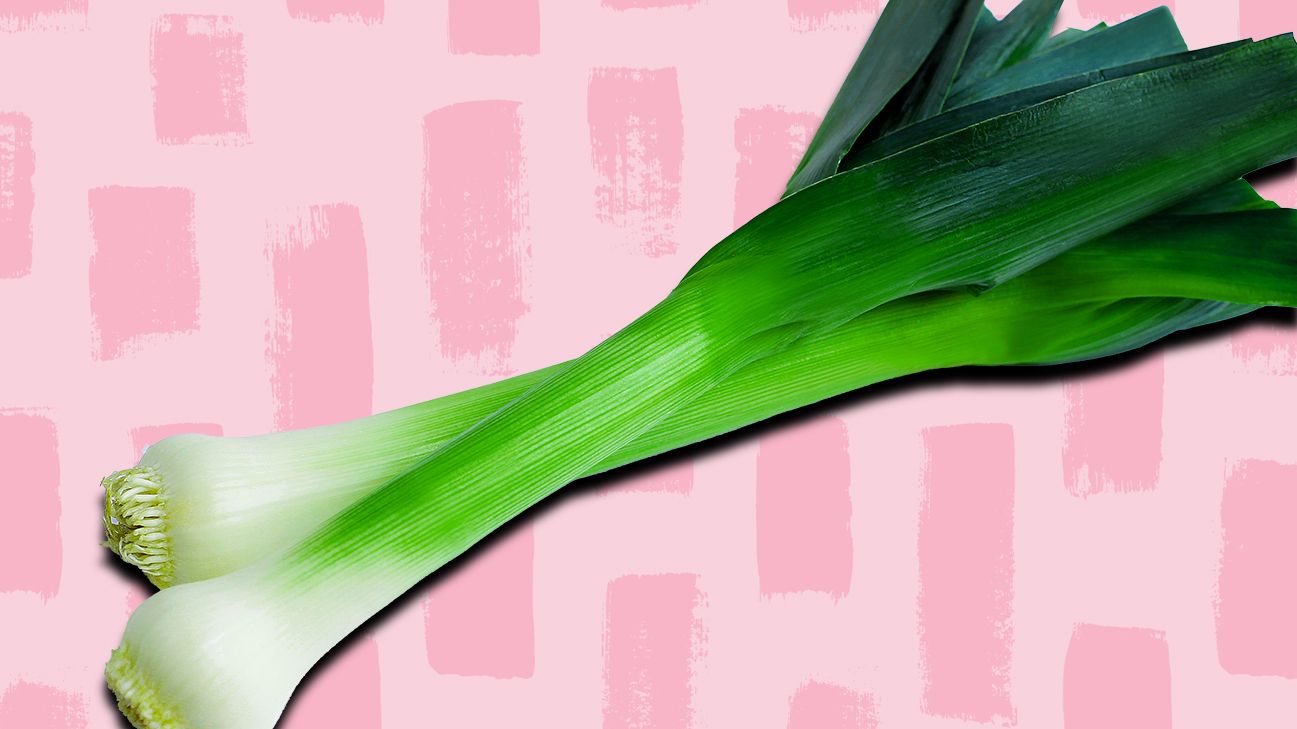Leeks, which look sort of like green onions that really work out, are members of the allium vegetable family that also includes onions, garlic, shallots, and chives.
The Welsh believed the leeks they wore on their helmets back in the 6th century won them victories on the battlefield. Though we can’t promise superhuman strength, these veggies do offer some super health benefits. Roast ’em, pop ’em in a salad or stew, or use them in a quiche. Any way you slice them, leeks are delish and nutrish.

Just one cup of cooked leeks packs more than 30 percent of the daily value of vitamins A and K, and about 15 percent of the daily recommended folate and manganese intakes.
The folate in leeks may reduce complications of heart disease (not to mention pregnancy complications). Some of the other important nutrients that leeks have to offer are calcium, iron, potassium, and zinc.
Leeks owe many of their superpowers to their organosulfur compounds — phytochemicals that may carry immune-boosting benefits.
Research shows that organosulfur compounds help strengthen your immune system and provide protection against inflammation. Organosulfur compounds may also help prevent oxidative stress, which is caused by an imbalance of free radicals and antioxidants in your body that can result in damage to your cells and tissues.
The same compounds can be found in other allium family vegetables, too, as well as in vegetables like broccoli, cauliflower, and cabbage.
Leeks are a solid source of fiber, including prebiotics, the kind that feeds that good bacteria in your gut. You know we love that diverse gut bacteria.
The bacteria in our tummies produce something called short-chain fatty acids, which do all kind of good things for us like regulate our metabolism and reduce inflammation.
The gut microbiome (all of the good bacteria in our digestive system) affects SO many facets of our health that it pays to add in foods that aid it.
Studies suggest that people who regularly eat leeks and other allium vegetables may have up to a 46 percent lower risk of gastric cancer than people who don’t eat them, but further studies are needed to be sure.
Leeks may also protect you from colorectal cancer. A case-control study of 833 people in China found that the odds of getting this cancer was 79 percent lower for those who ate more leeks and other allium family vegetables.
Leeks are a good source of allicin, a compound that may have the potential to help prevent cancer.
Leeks may also help prevent breast cancer. A case-control study of 285 women in Iran found that those who ate more leeks and garlic had a significantly lower risk of breast cancer. The researchers suggest that the reduced breast cancer risk is thanks to the various organosulfur compounds in leeks.
Researchers are still uncertain exactly why leeks may help prevent cancer in general, but it’s been suggested they could stop the spread of cancer cells, foil carcinogens’ evil plots, and beat up damaging free radicals.
There’s plenty of vitamin A in leeks, which helps maintain healthy eyes, skin, and teeth.
Vitamin A is especially important for your vision. It’s also known as retinol, which creates pigments in your retinas. This helps maintain your eyesight, particularly in low light. It also helps prevent serious eye diseases like age-related macular degeneration (AMD).
Retinol is also beneficial for your skin. It helps produce elastin and collagen, proteins that plump up your skin and reduce the appearance of wrinkles and pores.
And that’s not all! Vitamin A has benefits for your mouth, too. It helps prevent gum disease (periodontitis) and helps strengthen your tooth enamel.
Like its relatives onion and garlic, leeks are ultra versatile. Their flavor is similar to an onion’s, but milder, and they have a creamier consistency when they’re cooked. And though they’re OK raw, they can be cooked in almost any way imaginable. (Candied? Probably not.)
The white and light green portions of this scallion-like veggie are eaten; the darker leaves typically are not.
Look for leeks that are stiff, white, and green — not wilted or yellow — and the smaller the stalk, the better the texture. Store them straight from the store (no trimming or washing) in a nice dark fridge, as light can shorten their lifespan.
While this greenery is safe for most people, those with kidney stones should pass. This is because leeks contain lots of oxalates, substances that can form crystals in your urine.
On the other hand, those dealing with swelling due to water retention could give leeks a try — they’re a natural diuretic.
Ways to incorporate leeks into your life
Ready to start enjoying all the health benefits leeks have to offer? Here are some yummy recipes and ideas to try:
- Braised leeks with pappardelle and Parmesan
- Roasted garlic and leek soup
- Kale, mushroom, and leek savory bread pudding
- Roasted carrot, leek, and goat cheese hand pies
- Cauliflower 40 ways to sneak veggies into any meal without sacrificing flavor
- Use leeks in these fake meat recipes
- Trader Joe’s Riced Cauliflower Stuffing is loaded with leeks!

